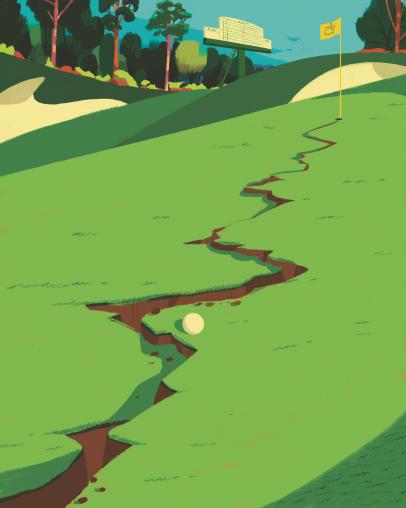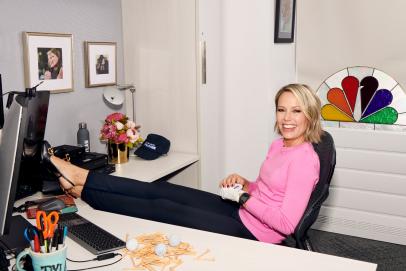journeys
‘Being Labeled a Prodigy Hasn’t Been Easy’
How Lucy Li returned to form after losing her love of the game

No one will let me forget my 2014 U.S. Women’s Open press conference at Pinehurst. I was 11 years old, spinning in my chair and eating ice cream as I answered questions. Eight years later, I have my LPGA Tour card. Through my career, being labeled as a prodigy hasn’t been easy. I’ve struggled with confidence and worked hard to avoid burnout.
● ● ●
When I was 7, I went with my mom to pick up my brother, Luke, from the range, and I started hitting balls. I fell in love with it instantly. I started beating Luke pretty quickly, and it was clear I was getting good fast. I took my school classes online because it made scheduling easier. I had a lot of friends through golf, so I don’t feel like I sacrificed anything.
● ● ●
The summer I was 10, I qualified for the U.S. Women’s Amateur and the Public Links. I’m the youngest to qualify for the Am and the youngest to make it to Pub Links match play. I was 20 yards shorter than everyone because I was so small, not yet 5 feet tall, but I hit it straight. My proximity with my 3-wood was better than my wedges.
● ● ●
The next summer, I qualified for the inaugural Drive, Chip and Putt. My favorite golfer growing up was Bobby Jones. I knew the importance of Augusta National and remember stepping out on the perfect-looking grass, wondering if it was AstroTurf. I won my age group, and afterward we got to watch a practice round. First thing I did was go to Amen Corner. The azaleas are even more beautiful in person.
● ● ●
That summer I signed up for the U.S. Women’s Open qualifier at Half Moon Bay. I shot 74-68. I won the qualifier by seven shots. It was surreal. I was the youngest to ever qualify. I shot 78-78 to miss the cut, but my dream of being a professional golfer felt more real there than it ever had.
I got calls to do “Good Morning America” and things like that. My mom knew it was too much for an 11-year-old, so we said no to a lot. I went back to playing junior and amateur events. My parents always looked out for me as a person, not just a golfer.
● ● ●
I couldn’t avoid all the attention. People would ask, “When are you turning pro?” I had no idea. I felt the expectations. About that time, I met Johnny Miller through friends in the Bay Area. He’s become a great mentor. He helped me realize that just because I was the youngest to do a lot of things didn’t mean I had to turn pro right away.
● ● ●
Johnny and one of my other mentors, the late Mickey Wright who I met through the USGA, were both steadfast in not letting anyone touch my swing. I’d been to coaches in the past, but it’s important to be able to sort out problems yourself. Whenever I’m out of sequence, I look at videos. If I’m really stuck, I’ll have someone I trust troubleshoot it with me—like Johnny, my parents or Mickey before she passed away.
● ● ●
In 2019, at age 17, I wasn’t excited looking at my schedule. It was time for the next step: I turned pro. My parents trusted my decision. By 2020, I was on the Epson Tour and had three top-five finishes. I started out OK in 2021 but then missed four cuts in five Epson events. I spent the off-season finding my confidence, which is ironic because when I look back at what I did when I was little, the thing I remember most vividly is how confident I was.
● ● ●
I asked myself, Why are you playing golf? Through the grind, I’d lost the answer to that question. I play because I love to compete and get better. I went into 2022 focused on that versus the results, and it worked. I had fun. It produced my first pro win. I birdied 18 to force the playoff and finished it on the first hole with an eagle. A few weeks later I won again on the Epson Tour.
I felt a surge of confidence. I clinched my LPGA card through my position on the Epson Tour money list and got some early LPGA starts. I was in the final group at the Dana Open Sunday and played OK, but the experience made me even more excited to get out there.
● ● ●
Taking online classes at the University of Pennsylvania has been a lot to balance, but it helped me throughout last season. If I finished a round missing a four-footer, I couldn’t replay it in my head a thousand times. I’d have an assignment due in three hours. I’m going to major in data analytics and psychology. I’m focused on my golf career right now, but someday I’d like to use my degree in the tech, climate change or venture-capital spaces.
● ● ●
I can’t wait to play more internationally, especially in Asia. A goal of mine is to make the Solheim Cup team, but I know how hard it’ll be. It’s crazy how confident I was as a kid. If I lose self belief, I’ll go back to that feeling.


